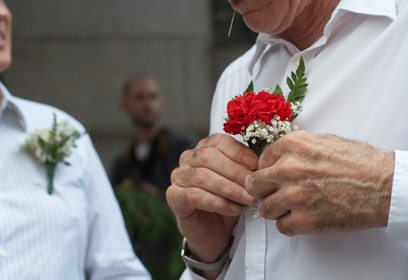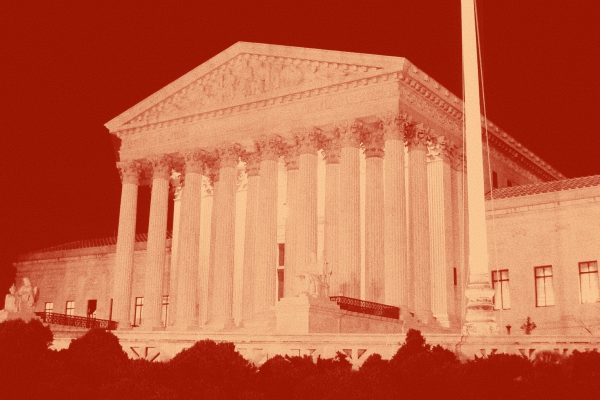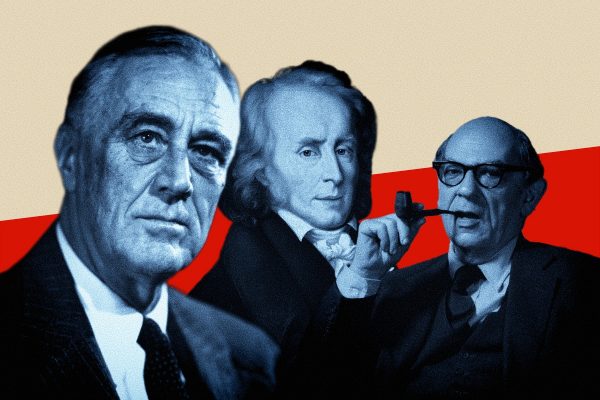The plaintiffs who moved the Supreme Court to grant homosexuals “equal dignity” in marriage under the U.S. Constitution were the bereaved widower of a man who died of Lou Gehrig’s disease, an Army lifer and his male partner, and a couple of lesbians so devoted to children that they adopted three with severe disabilities.
Like the nine African Americans whose murder in Charleston has persuaded white America finally to consider doing something about racism—“good people, decent people, God-fearing people,” President Barack Obama called the church members—they were as innocent as victims could be.
And like the families of the slain, the gay and lesbian petitioners forgive the people and institutions that have hurt them. Indeed, they “respect [marriage] so deeply that they seek to find its fulfillment for themselves,” writes Justice Anthony Kennedy for the majority. All they want is “not to be condemned to live in loneliness”—apparently the fate of unmarried people. Yet because of “their immutable nature,” they have no option but same-sex matrimony.
In other words, these people did not choose their plight; they do not deserve their punishment. Unlike, say, the hundreds of African American bad guys killed by police every year—the guilty victims.
The morning the Court’s ruling came down, I was sitting in a frigidly air-conditioned room in a Dallas church, listening to a preacher give a motivational speech to a roomful of guilty victims. It was the annual convention of Reform Sex Offender Laws, or RSOL, a national coalition of registered sex offenders (RSOs), men currently incarcerated on sex offense convictions, and their loved ones fighting to end the U.S.’s war on sex.
Texas was a logical place to hold the gathering: the state’s sex offender registry lists 86,000 people—about 10 percent of the nation’s total.
Some of these people undoubtedly committed serious violent crimes. But many had been in prison for years and on the registry for decades for hands-off offenses like flashing, chatting online with a federal agent masquerading as a minor, or downloading child pornography—a category that includes everything from pictures of babies being sodomized to photos of adults morphed to look like minors.
The government treats these offenses with almost fetishistic severity and bizarre unreason. Last week, while Charleston’s mass murderer Dylann Roof was being held on $1 million bond, a San Diego judge set bail for a man accused of taking pictures of pre-schoolers with their shirts off at $3 million.
Another story: The executive director of Texas’s RSOL chapter recounted events at her household since her son was released after serving time for downloading child pornography. The ED got special permission to let him live in a trailer on their property, where her daughter and infant granddaughter also have a mobile home. The son is prohibited from entering the house while the baby is inside. But just to be safe, the authorities have also erected a fence around his trailer. His mother is not sure whether the fence is meant to keep the baby out, or the son in.
Someone raised a hand during the preacher’s speech and announced the Supreme Court ruling. Some people clapped. Then the preacher—who had been pointing out, in reference to the sex offender registry, that just because something is the law, it is not necessarily right—deftly implied that the principle also goes for same-sex marriage.
I could see the fences going up, between those whose sexual lives the state sanctifies and those who could never get that blessing, even if they wanted it.
I saw in my mind a diagram of the “sex hierarchy,” drawn in 1984 by anthropologist Gayle S. Rubin: a series of walls with “Good, normal, natural, healthy, holy” sex—“heterosexual, married, monogamous, reproductive, at home”—at one end, protected by a high wall, and “Bad, abnormal, unnatural, sick, sinful, ‘way out,’” beyond a low wall at the other end. The exiled included, among others, transsexuals and people who have intergenerational sex or sex for money.
These are the people on the registry. Many are queer, poor, and already marginalized. In some states it is a felony to fail to inform a sex partner of positive HIV status—even absent HIV transmission. In others places, “crimes against nature”—any intercourse besides penile-vaginal—put you on the registry. The offenders are likely to be trans women selling sex and men who have sex with men in public places. They could be runaway queer kids hustling for a meal, a bed, or a few bucks.
As far as I could glean, all the gay registered offenders at the RSOL conference were imprisoned as minors or just-turned adults. They were doing what a lot of gay boys do when they’re figuring out their sexuality: touching, kissing or masturbating with a younger—sometimes much younger—person.
The Supreme Court’s ruling in favor of same-sex marriage is a civil rights victory. The justices shifted one of Rubin’s sexual categories—“long-term, stable lesbian and gay male couples”—from the contested middle to the shelter of the good, normal and holy.
But civil rights are not the same as sexual liberation. In fact, the opinion might be considered the opposite. Marriage is about health care proxies, death benefits, taxes, child custody, Kennedy writes. Marriage is “intimate to the degree of being sacred”; its purpose is “noble.” Marriage “embodies the highest ideals of love, fidelity, devotion, sacrifice, and family.” The opinion legitimating same-sex unions is virtually redacted of sex.
Meanwhile, the same court has upheld every cruel and unusual punishment of sex offenders, including lifelong public registration and indefinite confinement in “civil commitment” for crimes yet to be committed.
We should celebrate the expansion of civil legal equality in America. But without sexual liberation, the founding impulse of what was once called the Gay Liberation Movement, there will be sexual oppression and sexual violence. Without sexual liberation—the antithesis of a court’s imprimatur—the wedding registries will proliferate on one side of the wall, and the sex offender registries on the other.








